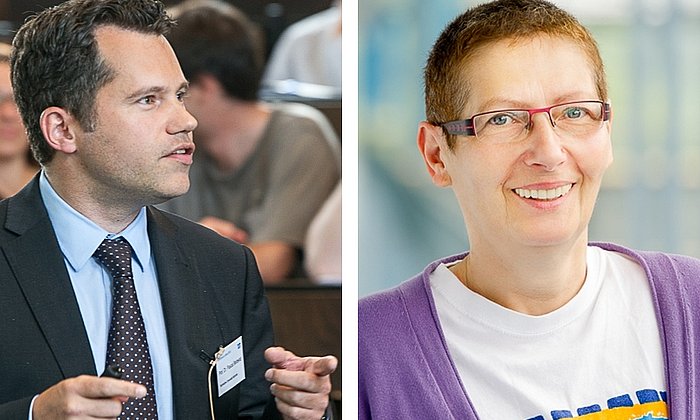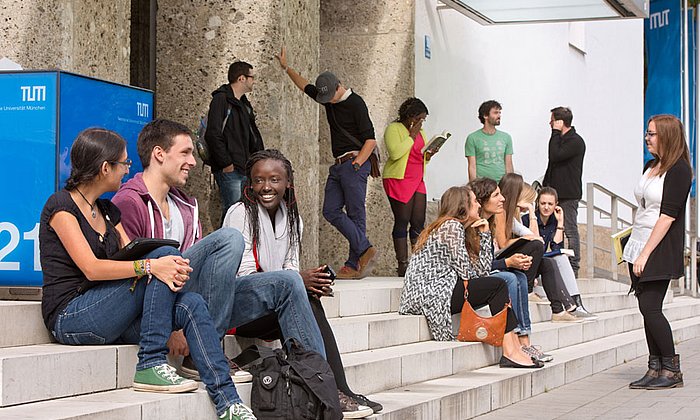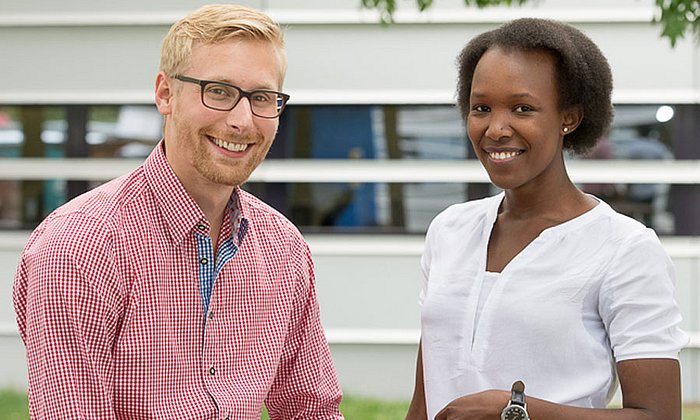Dropout rate significantly lower than at other universities
TUM increases graduation rate with aptitude assessment

TUM investigated the courses of studies for the classes that began their studies from 2008 to 2011. In the Bachelor's degree programs in which the student's aptitude for the curriculum was tested before admission, after 8 semesters 20 percent of the students had exmatriculated without completing their degrees. Germany-wide the dropout rates are at 32 to 35 percent, according to the regularly conducted survey by the German Center for Higher Education Research and Science Studies (DZHW), most recently analyzing the graduating class of 2014.
Looking at individual subjects, the dropout rate in all Bachelor's degree programs for which TUM conducts admissions interviews is significantly lower than at German universities as a whole. In ten subjects the TUM dropout rates are at most half as high as the German average, based on the respective most recently surveyed classes. The following examples will illustrate the dimensions:
| Bachelor's degree programs | TUM | all German universities |
| Mathematics | 22 % | 51 % |
| Informatics | 20 % | 45 % |
| Chemistry | 19 % | 42 % |
| Mechanical Engineering | 22 % | 31 % |
| Economics | 12 % | 30 % |
| Biology | 9 % | 22 % |
(TUM: First semester class winter semester 2011/12, exmatriculations without degree; DZHW: graduating class 2014, dropouts)
Actual dropout rates even lower at TUM
The actual dropout rates at TUM are even lower than the currently collected data indicates. This is because the TUM analysis includes all exmatriculations without degree, including students who have not actually dropped out, but rather have chosen to continue their studies at another university. The Germany-wide studies by the DZHW however eliminate those changing universities from their data.
Master's degree students at TUM are more successful than students at other universities as well. While at TUM only 5 to 6 percent exmatriculate without a degree, the Germany-wide dropout rate is 11 to 15 percent.
"Talent, curiosity, enthusiasm"
Prof. Wolfgang A. Herrmann, President of TUM, emphasizes: "We take a closer look at who wants to study with us than other universities do. We also pay attention to talent and the ability to think scientifically, to curiosity and enthusiasm. These qualities are not necessarily reflected by secondary school grades. Again and again we encounter high school graduates with Abitur (Baccalaureate) who come to us with below-average Abitur grades due to their personal situations, but who then graduate with excellent grades."
TUM introduced the procedure for aptitude assessments as early as 2000 and then by and large did away with the numerus clausus for admission. Another portion of the curricula offered is open-admission. In the first step of the aptitude assessments TUM considers performance in the secondary school degree, differentiated according to individual subjects. Students who score more than a defined number of points are admitted immediately, those who score fewer than a certain number of points are rejected. All other candidates are invited to an admissions interview. How do they approach their subject? What motivates them to study? Do they also display perseverance when dealing with difficult topics? Based on this kind of criteria, experienced faculty members evaluate the candidate's aptitude for studying. All those who are properly suited are admitted.
"Admission without a selection procedure: Comfortable, unfair and wasteful"
TUM makes a considerable effort to conduct this selection procedure, which involves 5,000 to 6,000 interviews for the winter semesters alone. "The numbers make it clear: It's worth it," says President Herrmann. "We also regard this effort as a societal obligation. Society cannot afford to waste resources on an undifferentiated process such as the numerus clausus – neither the talented individuals who are denied admission in spite of their aptitude, nor the financial resources contributed by all those involved when young adults choose the 'wrong' course of study."
In spite of over 15 years of outstanding results, legal regulations pose an obstacle to the aptitude evaluation process. The process is only permitted in degree programs with particular characteristics. "Our study indisputably proves one thing: A clever selection of students results in greater success in studies and ultimately benefits everyone," says Herrmann. "The political sector is urgently called upon to grant universities increased freedom in designing their own admissions systems." He added that selection procedures are the most important instrument in quality assurance. On the other hand, he continued, it is comfortable but unfair and wasteful to admit candidates solely on the basis of their secondary school Abitur, only to see them fail and drop out after the first year at university.
Publication:
Sanaa, Veronika; Kasper, Eva: Erfolgreich studiert? Ergebnisse einer quantitativen Kohortenanalyse, München 2017. DOI: 10.14459/2017md1398660
More Information:
Technical University of Munich
Corporate Communications Center
- Klaus Becker
- klaus.becker@tum.de
- presse@tum.de
- Teamwebsite




